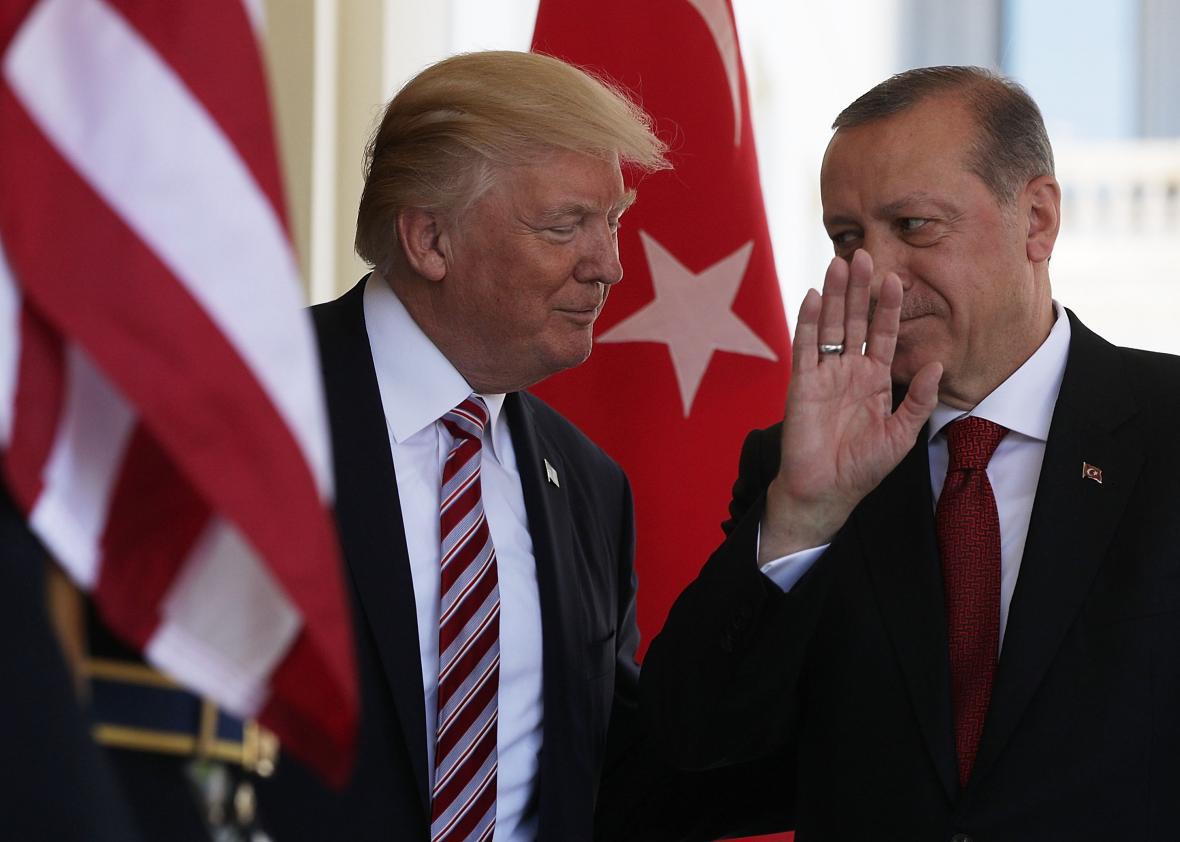Over the weekend, Turkish President Recep Tayyip Erdogan took some steps to exercise the powers he won in a controversial constitutional referendum last month, which dramatically expanded the role of the presidency, a job Erdogan could now potentially hold until 2029.
The referendum was widely seen by Erdogan’s opponents and outside observers as a shift toward authoritarianism. The president has been eliminating potential opponents on a massive scale. A trial of 221 suspects in last June’s failed coup attempt against Erdogan, including dozens of former generals, began in Ankara on Monday. Erdogan has blamed the coup on followers of the exiled cleric Fethullah Gulen—he denies involvement—and thousands of suspected Gulenists have been arrested in a post-coup crackdown, often on very flimsy evidence.
The Trump administration doesn’t seem to care much about any of this. It has signaled that it considers human rights concerns to be an unnecessary impediment to economic and diplomatic goals, a stance very much underlined by Trump’s recent visit to Saudi Arabia. Despite all the international criticism of the referendum, Trump called to congratulate Erdogan on his victory in April. According to a Reuters report, Trump described Erdogan has a “great guy” in a conversation with German Chancellor Angela Merkel in April, and was surprised when she brought up that he had been calling European governments Nazis for not allowing his ministers to campaign for the referendum in Europe. Trump was apparently unaware of the pretty well-publicized controversy.
Recent headlines should make it harder for the administration to ignore Erdogan’s increasing authoritarianism or brush it under the rug. Last week, while Erdogan was visiting Washington to meet with Trump, his bodyguards were filmed beating up a group of mainly Kurdish protesters outside the Turkish ambassador’s residence while the Turkish president watched from his car. The State Department expressed concern about the incident, which might have been the end of it, except that Ankara isn’t letting it go: Turkey summoned the U.S. ambassador on Monday to protest the “aggressive and unprofessional actions” by American security personnel against the bodyguards during the incident. Evidently, the guy putting a woman in a chokehold in a foreign capital is the aggrieved party here.
Also, over the weekend, NBA player Enes Kanter, who is among the most famous and visible Turks in the United States, was detained at an airport in Romania, reportedly because his passport was canceled by the Turkish government. The Oklahoma City Thunder center said in a video posted on Twitter that he believes this is because of his political views: Kanter is a supporter of Gulen and called Erdogan the “Hitler of our century.” Kanter is now back in the U.S. and says he wants to become a U.S. citizen. (There hasn’t been an official response from the Turkish government yet. )
There’s also the ongoing saga of Andrew Brunson, the American pastor who had lived in Turkey for more than two decades before being arrested and held on terrorism charges in the run-up to the referendum. Trump and Vice President Mike Pence—who has taken a particular interest in the case—raised Brunson’s case in the meeting with Erdogan in D.C., but there doesn’t appear to be any movement. The official charges against Brunson have not been released, but last week the Turkish media reported some new details of what he’s accused of. Hurriyet reports that Brunson is accused of giving a “special sermon” to a group of Kurds and saying during a meeting at his church that it would be “beneficial to have dialogue” with the Fethullah Gulen movement. This was apparently enough to get him charged as a member of the “Fethullahist Terror Organization,” as the Turkish government refers to the Gulen movement. Some of Brunson’s supporters worry that he is being used as a bargaining chip in U.S.-Turkey talks.
For all this, it doesn’t really appear that the allegedly improved U.S.-Turkey relations under Trump are bearing much fruit. The administration want Turkish help in the fight against ISIS in Syria, but Turkey is outraged at U.S. support for Kurdish fighters there, who it considers to be terrorists. The Turkish media reported over the weekend that Ankara is stepping up training of its own Syrian rebel force, which has fought against both ISIS and the U.S.-backed Kurds—two groups Turkey considers equally threatening. This increases the risk of U.S. troops on the ground in Syria getting drawn into fighting with Turkish or Turkish-backed forces.
It might be easier to understand the Trump administration’s whitewashing of Erdogan’s abuses—including abuses against Americans and U.S. residents—if it was clear what the U.S. was getting out of it.
